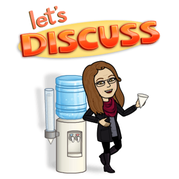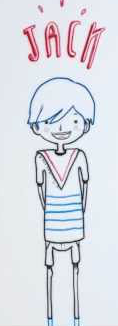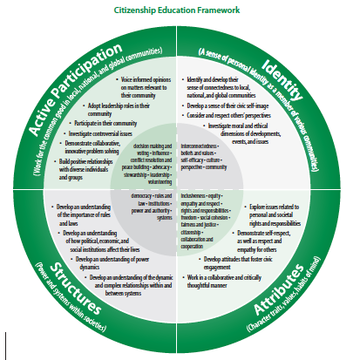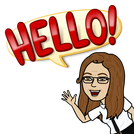Introduction to Media and Digital literacy topics

Welcome to EDUC 4000. Today's session will focus on 'ME' in media and digital spaces. We will spend some time getting to know each other. We'll dip into Media Literacy and then explore a citizen education framework as it reflects media and digital literacy topics. We'll generate some understandings about terms and definitions based on prior knowledge of these topics. We'll reviewing the course syllabus, course outline and required assignments. Course expectations and common ground will be examined.
NO Required Readings

Getting to Know 'ME in MEdia'
Our first activity today is getting to know you - as a media and digitally literate educator and citizen. We'll create a name card that is a 'media representation' of you.
Think, Pair Share: (more about this teaching strategy found here)
Our first activity today is getting to know you - as a media and digitally literate educator and citizen. We'll create a name card that is a 'media representation' of you.
Think, Pair Share: (more about this teaching strategy found here)
- THINK about objects, images, books, movies, music, events that would represent your 'media' presence. Write these out. THINK about what these choices tell about your interests, skills, or abilities as a media and tech savvy teacher and learner? THINK about the media message these could present in the classroom?
- PAIR with other members of the class to find someone who may SHARE similar items, while also sharing about yourself.
- SHARE in your table groups.
How do you currently share your 'self' in a media and digitally rich world? Are you a 'selfie' creator?
Where will you differentiate between your personal and professional 'self'?
What avatar would best present your 'self' in professional digital environments? Is it the 'real' you or an image?
What limitations of media and technology impact this image of your professional 'self'?
Why should we care about our media and digital 'selves'?
Where will you differentiate between your personal and professional 'self'?
What avatar would best present your 'self' in professional digital environments? Is it the 'real' you or an image?
What limitations of media and technology impact this image of your professional 'self'?
Why should we care about our media and digital 'selves'?
Teaching about MEDIA and DIGITAL LITERACIES

We'll begin with a video clip that introduces some important ideas and thoughts on the importance of teaching and learning about media and digital literacy. As you view this 'story', envision your role as an educator of young 'Jack', the hero of the story. Become aware of the forces and influences on Jack's life, the skills he brings to the story and how your role will influence the outcome of the story.
Lets begin with "A Journey to Media Literacy"
We'll explicitly apply the teaching strategy called 'think, pair, share' to deconstruct some understandings about media literacy, teaching and learning.
Lets begin with "A Journey to Media Literacy"
We'll explicitly apply the teaching strategy called 'think, pair, share' to deconstruct some understandings about media literacy, teaching and learning.
- First: THINK - jot down on a notepage, stickie or digital paper anything you recall from the story about Jack that you feel is relevant to your role as a teacher of media and digital literacy.
- Next: PAIR- with another person at your table to discuss your personal notes. How do they differ? Are there similarities? Which idea is the most important to each person?
- Finally: SHARE - one item that is an important or noteworthy idea, concept or thought with the whole group.
|
|
Citizenship Education Framework
 Ontario Social Studies Curriculum 2013, pg 10.
Ontario Social Studies Curriculum 2013, pg 10.
From the Ontario Curriculum for Social Studies, History and Geography, 1-8, there is a framework for citizenship education.
This framework can be analyzed in terms of media and digital literacy:
Each of these elements impact and can elaborate on our place in a media rich, digital world. They link to established elements of digital citizenship, as we will discover in the coming sessions.
This framework can be analyzed in terms of media and digital literacy:
- active participation - work for the common good in communities
- identity - sense of personal self within communities
- structures - power and systems within society
- attributes - character traits, values, habits of mind
Each of these elements impact and can elaborate on our place in a media rich, digital world. They link to established elements of digital citizenship, as we will discover in the coming sessions.
What is Media Literacy? What is Digital Literacy? What is 'literacy'?
|
Video Viewing Provocation
|
|
 http://www.online-stopwatch.com/full-screen-stopwatch/
http://www.online-stopwatch.com/full-screen-stopwatch/
Let's explore concepts and key understandings about Media and Digital Literacy.
ACTIVITY:
Review the following resources and collaboratively collect information.
Group 1 - Use, Understand & Create: A Digital Literacy Framework for Canadian Schools
Group 2 - Digital Literacy Fundamentals, Media Smarts Canada
Group 3 - Media Literacy Fundamentals, Media Smarts Canada
Group 4 - The Intersection of Media and Digital Literacy, Media Smarts Canada and Critical Literacy
Group 5 - Media Literacy Defined, National Association for Media Literacy Education (US based)
As you move through the models and ideas, work with your table group to collaboratively capture the concepts, key information and WORDS used. Create a concept map and/or a graphic organizer.
ACTIVITY:
Review the following resources and collaboratively collect information.
Group 1 - Use, Understand & Create: A Digital Literacy Framework for Canadian Schools
Group 2 - Digital Literacy Fundamentals, Media Smarts Canada
Group 3 - Media Literacy Fundamentals, Media Smarts Canada
Group 4 - The Intersection of Media and Digital Literacy, Media Smarts Canada and Critical Literacy
Group 5 - Media Literacy Defined, National Association for Media Literacy Education (US based)
As you move through the models and ideas, work with your table group to collaboratively capture the concepts, key information and WORDS used. Create a concept map and/or a graphic organizer.
- You will be given 15 minutes to collect thoughts, ideas and understandings from the resource materials.
- Be prepared to share your ideas and information with your group.
- Designate a 'spokesperson' who is prepared to share details with the whole class.
Video Viewing Provocation: (preparing to reflect and connect)
- What is your first reaction?
- How does your reaction and/or opinion change with this video?
- What biases do you bring to this media production and the messages shared, from your cultural context?
- What does the medium do to the message in this video?
- Is 'play' an important part of the educational experience? Why?
|
|
NEXT STEPS:
In our next session we will explicitly define terms relevant to media and digital literacy. This is an essential component to build the foundation of your teaching practice for these 'literacies'. We will delve into the world of teaching about media literacy and examine some frameworks (such as the one below) to categorize and connect ideas, concepts and definitions.
In our next session we will explicitly define terms relevant to media and digital literacy. This is an essential component to build the foundation of your teaching practice for these 'literacies'. We will delve into the world of teaching about media literacy and examine some frameworks (such as the one below) to categorize and connect ideas, concepts and definitions.
| digital-literacy-framework.pdf | |
| File Size: | 536 kb |
| File Type: | |
Preparing your Professional Presence in Digital Spaces
|

Take some time to craft your digital avatar image(s) using some of the tips and tools presented to you. Use the 'how to guide' inserted here to get you started.
Make sure you share your avatar in critical media spaces (email, learning management system, social media sites) to represent your digital persona. | ||||||
What did you catch? Words, terms, concepts, ideas, interesting thoughts!
Plant some of these in this Answer Garden.
Resources Links:
- Media Smarts: media literacy http://mediasmarts.ca/digital-media-literacy-fundamentals/media-literacy-fundamentals
- Media Smarts: digital literacy http://mediasmarts.ca/digital-media-literacy-fundamentals/digital-literacy-fundamentals
- California ICT literacy: http://www.ictliteracy.info/rf.pdf/California%20ICT%20Assessments%20and%20Curriculum%20Framework.pdf
- Michelle Pacansky Brock: Online Community Groundrules https://www.box.com/s/598tf96ebcztdcbikfnh
- Media Smarts: Digital Issues http://mediasmarts.ca/digital-media-literacy/digital-issues
- Collective Knowledge Construction presented by Ideaslab - http://www.ideaslab.edu.au/design-lab/ckc/
